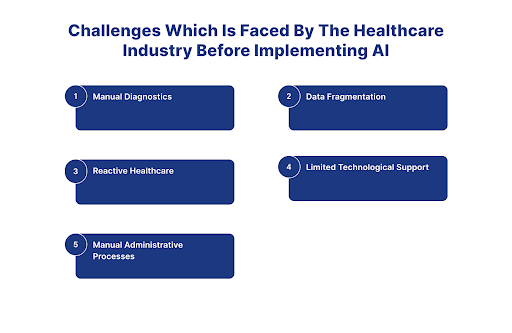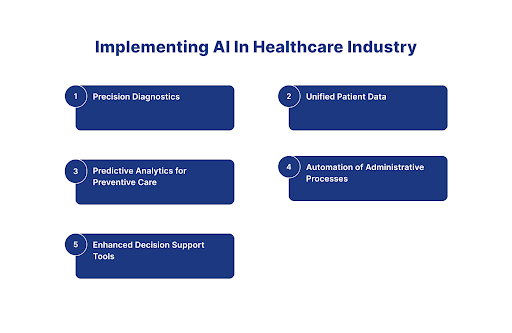AI in Healthcare industry: 5 Ways To Empower The Healthcare Industry By Implementing AI
Posted by Hitul Mistry
/03 Jan 24
Tagged under: #ai,#aiinhealthcare,#healthcare
incorporate Ai in healthcare industry has opened the door for profound shifts in the provision of patient care.
Introduction

- incorporate Ai in healthcare industry has opened the door for profound shifts in the provision of patient care. Artificial intelligence (AI) can revolutionize the healthcare sector by increasing patient involvement, optimizing administrative processes, detecting and treating diseases more effectively, and improving overall operational efficiency. Doctors and other healthcare professionals may better judge their patients by using AI's capacity to analyze large volumes of data and derive insights. In this article, we'll look at some ways to implement AI in the healthcare industry.
Challenges which is faced by the healthcare industry before implementing AI

1. Manual Diagnostics
- An enormous amount of medical image interpretation, including X-rays, MRIs, and CT scans, was done by hand by healthcare experts. Healthcare practitioners struggled to effectively analyze complicated datasets,often leading to delays in both diagnosis and treatment. Manual diagnostics' intrinsic subjectivity and lengthy process made it difficult to make timely treatments, which might impact patient outcomes.
2. Data Fragmentation
- The dispersion of patient data across several platforms and systems was one of the significant challenges. The absence of communication between Electronic Health Records (EHRs) led to information fragmentation and impeded the ability to comprehend a patient's medical history fully. In addition to checking healthcare professionals' capacity to make well-informed judgments, this lack of data interoperability increased the possibility of mistakes resulting from inadequate information.
3. Reactive Healthcare
- For the most part, the healthcare system used a reactive approach, treating diseases and other medical disorders after they had become apparent. Healthcare workers failed to recognize possible health issues before they worsened due to a lack of advanced technologies for proactive treatment and predictive analysis. There was less emphasis on preventive care and more on treating pre-existing problems than on avoiding new ones.
4. Limited Technological Support
- When it came to technology-assisted decision-making, healthcare workers encountered limitations. Keeping current with the most recent findings, treatment recommendations, and medical literature was challenging without sophisticated decision support tools and real-time data analytics. This deficiency in technology infrastructure hindered the capacity to make educated, fact-based judgments.
5. Manual Administrative Processes
- The majority of administrative duties were manual and resource-intensive, such as arranging appointments, billing, and maintaining records. These procedures' inefficiencies led to delays, incorrect invoicing, longer reimbursement cycles, and an increase in the burden for medical staff.
implementing AI in healthcare industry

1.Precision Diagnostics
- The diagnostic skills of healthcare have seen a dramatic shift when AI was integrated. Cutting-edge AI-powered diagnostic tools use machine learning techniques to examine enormous amounts of information, such as test results and medical pictures. This facilitates faster and more precise diagnosis for medical experts. AI systems can spot minute patterns and abnormalities that the human eye can miss, which lowers the chance of incorrect diagnoses and dramatically speeds up the period between diagnosis and treatment. In this way, you can implement AI in the healthcare industry.
2.Unified Patient Data
- By establishing a cohesive ecosystem for patient data, artificial intelligence has effectively tackled the problem of data fragmentation. Electronic Health Records (EHRs) interconnectedness has made it possible for medical providers to access a patient's medical history in real-time. This smooth integration promotes better decision-making, increases provider coordination, and strengthens overall continuity of care. In this way, you can implement AI in the healthcare industry.
3.Predictive Analytics for Preventive Care
- The transition from reactive to proactive treatment is one of the biggest effects of AI in healthcare. AI systems examine patient data to forecast results and spot possible health hazards. This makes it possible for medical professionals to take action and execute preventative measures and individualized treatment programs before problems worsen. The capacity to anticipate and avert health problems signifies a significant shift in healthcare, stressing a more comprehensive and proactive strategy for patient welfare. In this way, you can implement AI in the healthcare industry.
4.Automation of Administrative Processes
- Numerous administrative procedures that were labor-intensive and manual have been reduced and automated thanks to the incorporation of AI. Scheduling appointments, billing, and maintaining records are among the tasks that are now less error-prone and more efficient. Healthcare workers may devote more time to patient care thanks to automation, which also helps to make the healthcare system more efficient and affordable. In this way, you can implement AI in the healthcare industry.
5.Enhanced Decision Support Tools
- AI has given medical practitioners cutting-edge decision support tools and real-time access to the most recent research, treatment guidelines, and medical literature. Healthcare practitioners can make well-informed decisions thanks to machine learning algorithms, which analyze massive volumes of data and deliver evidence-based suggestions. This degree of assistance improves patient outcomes by raising the standard of treatment. In this way, you can implement AI in healthcare industry.
Conclusion
-
In summary, the implementation of AI in healthcare industry is a revolution that has radically changed the nature of patient care, not only a technological advancement. AI is emerging as a shining example of innovation, leading the healthcare sector towards unprecedented efficiency and better results. Examples of this include:
-
The precision of diagnostics.
-
The unification of patient data.
-
The proactive treatment of patients.
-
As AI's revolutionary effects become more apparent, it is evident that we are creating a future in which healthcare will include more than just treating patients—instead, it will involve anticipating, preventing, and customizing treatment to usher in a new age of well-being.
How digiqt will help you to adapt AI in your company
-
At Digiqt, we are dedicated to assisting companies in automating critical processes. Our highly skilled and professional team ensures the timely development and delivery of AI software. We commence by thoroughly understanding our client's specific requirements, and based on these requirements, our proficient team develops the AI software. Furthermore, we provide our clients with monthly updates on the software development progress.
-
Digiqt's commitment to automation, client-centric software development, and regular updates ensures efficiency and effectiveness in streamlining insurance operations.
Contact Us
About Us
We are a trusted, quality driven and value-driven digital product development company delivering services in BFSI sector.
Digiqt Technolabs is a passion turned into a company. We are a trusted product development company that specializes in turning your ideas into digital solutions utilizing our years of experience in industry-leading technologies.
We deliver high-tech innovations and great solutions for our clients in the most efficient manner regardless of the project complexity.
We are trusted, quality-driven and value-driven product development company.

Our key clients
Companies we are associated with
Our Offices

Ahmedabad
706,31FIVE Building,opp.Palladium, Corporate Rd, Makarba, Ahmedabad, Gujarat.
+91 99747 29554

Mumbai
WeWork, Enam Sambhav C-20, G Block,Bandra- Kurla Complex, MUMBAI-400051, Maharashtra.
+91 99747 29554

Stockholm
Bäverbäcksgränd 10 12462 Bandhagen, Stockholm, Sweden.
+46 72789 9039












